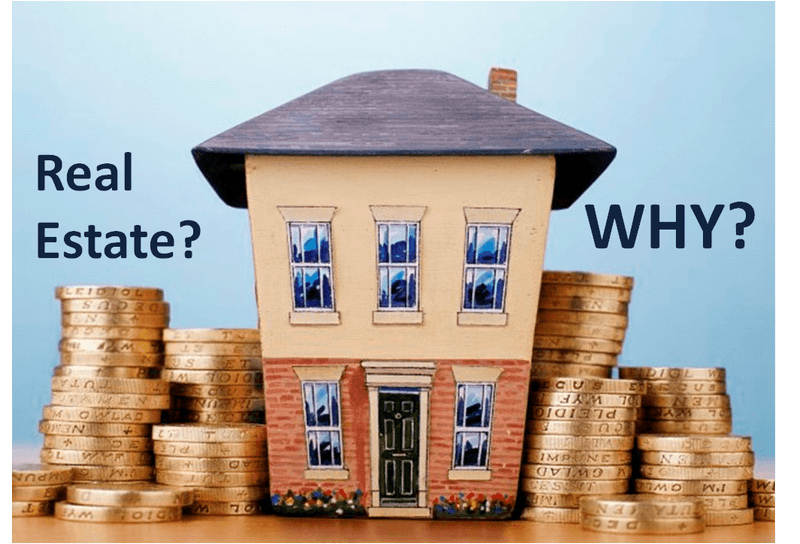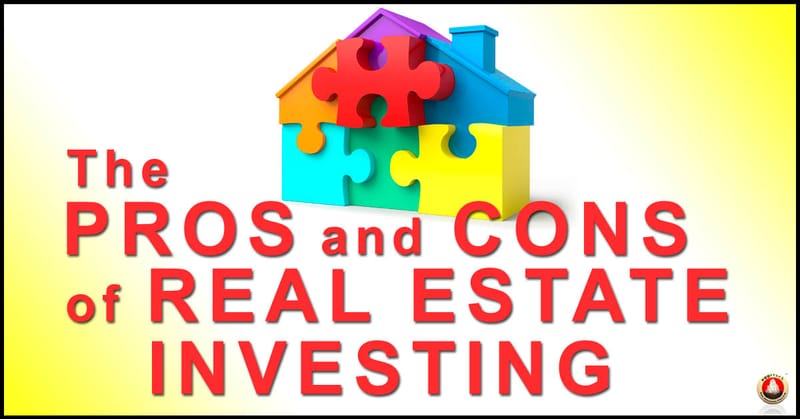Why Invest in Real Estate: 7 Key Benefits to Know

Investing in real estate can be an incredibly rewarding and lucrative endeavor, but if you’re like a lot of new investors, you may be wondering WHY you should be investing in real estate and what benefits it brings over other investment opportunities.
In addition to all the amazing benefits that come along with investing in real estate, there are some drawbacks you need to consider as well.
We’re going to cover the 7 top reasons why you should be investing in real estate (and a few reasons you may not want to jump in right away!).
Let’s get started.
Opportunity for Cash Flow
Purchasing real estate to rent it out for additional cash flow is becoming a very popular investment strategy, and it’s easy to see why.
Not only do rental properties give you the opportunity to generate additional cash flow month-over-month, but they allow you to build up a portfolio of long-term, stable assets and benefit from all that appreciation over the life of your investments!
There’s another big advantage to cash flow: it provides an opportunity for new real estate investors to “house hack”.
It’s no secret that real estate prices are going up and pushing a lot of new investors out of the market. When you decide to purchase a rental property, you can use the cash flow to fund your living expenses and pay your mortgage down faster to continue investing in more real estate!
Many newbie investors buy duplexes or houses with additional dwellings to make extra cash to fund their real estate dreams.
If you’re looking for a way to buy into the real estate market without having to spend hundreds of thousands of dollars, check out our properties. At BuyProperly, we use a fractional ownership model that allows investors to start with as little as $2500.
High Return on Investment
Another major benefit of real estate investing is the ability to make a high return from buying, renovating, and reselling (a.k.a. house flipping).
Although this requires significantly more upfront cash than rental properties, there’s huge potential for profit if you buy the right property.
Most flippers look for undervalued buildings in great neighborhoods. These properties need work (and money!) to get them up to average market value, but, once renovated, the returns from these resales can happen relatively quickly.
Appreciation
The wonderful thing about investing in real estate is that the value of the property is expected to appreciate. The principal amount that you invested in the property will grow over time and should be worth more than what you paid for it when you purchased it.
Real estate is a fantastic long-term investment because it’s almost always guaranteed to appreciate in value.
Investors patient enough to buy and hold their properties will benefit from predictable appreciation year-over-year. Depending on where you buy, you can expect annual appreciation rates anywhere from 2-8%.
In Canada, there’s been an average 6.11% annual appreciation over the last 15 years!
Tax Benefits
Another major advantage of investing in real estate is all the tax benefits you’re eligible to take advantage of!
Many investors can write off costs associated with depreciation, mortgage interest, operating costs, repairs, and property tax. These incredible tax benefits are a fantastic way for investors to save and build wealth.
For example, if you are charging $2,000 rent per month and you incurred $1,500 in tax-deductible expenses per month, you will only be paying tax on that $500 profit per month. That’s a large difference from paying taxes on $2,000 per month.
The profit that you make on your rental unit for the year is considered rental income and will be taxed accordingly.
It is vital that you keep good accounting records on your investment property. If you are claiming maintenance and repairs, for example, be sure to keep those receipts as proof. If you are to be audited by the government and can’t supply the proof of expenses in form of official receipts, chances are you will be disqualified from claiming those tax deductions.
The appreciation of the property will be assessed when you dispose of the property and capital tax will come into play.
You will be taxed on the capital gains that you earned on the property from when you invested and purchased the property to the day you sold it. The difference between the sale price and the price you paid to purchase will be the capital gain, which will be taxed, but only in the year that you dispose of the property.
Low Volatility
Real estate isn’t subject to the same volatility as other kinds of investments. Unlike stock trading, the real estate market isn’t like to have the same massive overnight shifts.
For this reason, it’s an option for people who want something more stable and predictable. It’s a great addition to a more risk-averse portfolio, making it an all-around fantastic investment!
It’s important to note that real estate investment doesn’t come without risk. The US housing market crash of 2008 showed investors the importance of not over-leveraging and making smart investment decisions when growing their portfolios.
Leverage Your Investment
One of the most appealing aspects of real estate investment is the ability to leverage your assets. In a nutshell, leverage refers to “the use of debt (borrowed funds) to amplify returns from an investment or project”.
This means you can put 20%, 10%, or even 5% down and control an asset worth significantly more than that!
It also means you have the ability to borrow against your assets to continue investing. This creates a snowball effect and, when done effectively, can skyrocket your investment portfolio.
Passive Income
This last point ties into the other benefits we’ve mentioned above. Rental income aside, real estate accumulates passive wealth through its inherent tax benefits and long-term appreciation.
In addition, the rental income you collect can be done with minimal involvement and effort. With the right property managers and rental team, the ROI on your investment becomes relatively passive.
Here at BuyProperly, we help investors start with as little as $2500 and see projected annual (passive) returns of 10-40%! Find out how.
What are the cons of investing in real estate?
Real estate is a fantastic investment to add to your portfolio, but it doesn’t come without risk. Here are a few things all new investors should consider before jumping in.
Upfront costs
It’s no secret that investing in real estate the traditional way takes money. If you’re buying a property to live in, expect a minimum of 5% down plus closing costs. Most investment properties and second homes may even require a 20% down payment to buy!
Real estate isn’t cheap, and it’s important for new investors to be prepared for the costs.
Here at BuyProperly, we leverage a fractional ownership model to allow investors to buy real estate for as little as $2500. This means they can get started quickly without having to wait and save up huge lump sum deposits for investment properties. Want to see how we do it? ****Call to action here******
Sourcing deals
In addition to financial costs, investing in real estate comes with a significant time cost when you take into account sourcing property deals
Unlike buying and trading stocks which can be done with the click of a mouse, property investment often requires more time, research, and preparation.
Not only do you need to find great deals, but you need to analyze them and gather the necessary paperwork to get the deal done. On top of this, if you don’t have a good team in place, managing your repairs, maintenance, and tenants can turn into an overwhelming process.
Fortunately, sourcing great deals doesn’t have to be complicated. At BuyProperly, for example, we’ve created an AI-powered platform that allows investors to view, buy, and sell real estate digitally (much like they would trade stocks).
Let us show you how it works.
https://buyproperly.ai/
Difficult to unload
As much as we love real estate for its security and predictable returns, it’s not the type of investment that can be bought and sold quickly. In fact, the highest returns are earned when investors are willing to buy and hold.
If you think you may need to free up cash quickly, OR if you’re looking for an exceptionally quick profit, real estate may not be your main investment vehicle.
Conclusion
Investing in real estate has several major advantages. In addition to cash flow potential, you can also take advantage of steady appreciation, reduced volatility, and investor tax benefits.
It’s important to remember that real estate is a fantastic long-term investment, and not well suited to people who want instant returns. It’s a reliable, predictable asset with great cash flow and ROI potential.
Real estate is a great addition to any investor’s portfolio!
Interested in learning how you can get started in real estate investing for as little as $2500?
Learn more about real estate investing:
How to Build Wealth with Real Estate | Buyproperly
The 4 Best Investments for Inflation: Protect Your Wealth! | Buyproperly
Mastering Real Estate: The Top 50 Investment Books for Success | Buyproperly
